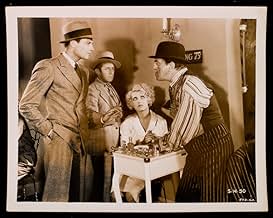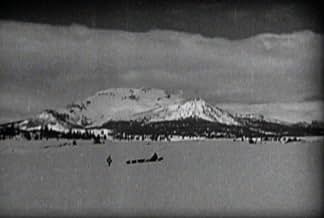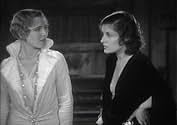A salmon fisherman has to choose between a bad girl and a society doll.A salmon fisherman has to choose between a bad girl and a society doll.A salmon fisherman has to choose between a bad girl and a society doll.
William B. Davidson
- Tom Hilliard
- (as William Davidson)
Dick Curtis
- Fight Spectator
- (uncredited)
Jimmy Dime
- Brawler
- (uncredited)
Robert Homans
- Servant
- (uncredited)
William H. O'Brien
- Waiter
- (uncredited)
Dennis O'Keefe
- Night Club Patron
- (uncredited)
Featured reviews
Is there a fan of old-timey Hollywood films out there who is NOT in love with Jean Arthur? With her wholesome good looks, spunky demeanor, inimitable cracked voice and superb acting abilities, Arthur was certainly amongst the top-tier comedic actresses of the '30s and '40s. "The Silver Horde" is an early talkie that she appeared in five years before her breakthrough role in 1935's "The Whole Town's Talking." In this one she is third billed, and her part is a subsidiary one, playing a "pasty-faced namby-pamby" society dame; the fiancée of Joel McCrea, who is trying to get a salmon cannery up and running in the wilds of Alaska. McCrea is being secretly abetted by hooker turned businesswoman Evelyn Brent, while his chances of success are constantly being endangered by a rival operation across the bay. Anyway, this is a pretty taut little picture. It moves along briskly, and features some convincing exterior shots. It also boasts at least three very fine sequences: a dukeout between McCrea and a big Swede who wants to quit his job; a face-off between Arthur and Brent over their common love interest (the viewer's sympathies are wholly with Brent, in this case); and a fascinating look at just how salmon are caught, processed and wind up in cans. You'll never look at your salmon salad the same way again, I promise you! Oh...one other thing. The folks at Alpha Video have done it again; yet another DVD with poor picture quality and even lousier sound. This company has a huge catalog of films available, but when will it realize that quality is just as important as quantity?
In 1930, as films were making the transition from silent to talkies, this pre-code film was released. It even contains a few title cards.
"The Silver Horde" refers to the running salmon as they attempt to make their way from the ocean to the rivers, improbably jumping upstream. The protagonist played by Joel McCrea is a man who runs a cannery. As he falls for a woman of bad reputation, he fights another canner who plays dirty.
The scenes of harvesting fish and inside a cannery are snapshots of an industry's state of the art.
The lily-white society girl who desires to reel in McCrea is played by Jean Arthur with no glimpse of the screwball comedienne she would become. She pales in comparison to the bad girl, played by Evelyn Brent, appropriately called Cherry.
This average film is interesting for its place in the development in cinema.
"The Silver Horde" refers to the running salmon as they attempt to make their way from the ocean to the rivers, improbably jumping upstream. The protagonist played by Joel McCrea is a man who runs a cannery. As he falls for a woman of bad reputation, he fights another canner who plays dirty.
The scenes of harvesting fish and inside a cannery are snapshots of an industry's state of the art.
The lily-white society girl who desires to reel in McCrea is played by Jean Arthur with no glimpse of the screwball comedienne she would become. She pales in comparison to the bad girl, played by Evelyn Brent, appropriately called Cherry.
This average film is interesting for its place in the development in cinema.
Although I enjoy old movies, this was just a bit to early for my liking. It was an early talky movie and you could tell by watching it that the equipment that it was filmed on and the actors and actresses were vintage. That being said, it was an interesting movie and easy to watch. Very simplistic plot with not much depth as was the case in this period of cinematography. It was very typical of the time period plot line where the guy gets the girl, even though she has a reputation of being a bad girl. The scenes that showed the actual canning of the salmon was of interest to me, in that it gave a glance back in history of the processing plant and early machinery.
This film, originally made by RKO but fallen into the public domain, is probably not going to appeal to most people, and not even to most fans of precode. However, it is still interesting viewing. It was made in 1930 - that first full year of all-talking pictures, and we are beginning to see the end of some silent acting careers and the beginning of some talking ones.
The story is that of Boyd Emerson (Joel McCrea), a man who wanders into a very unfriendly Alaskan town. He practically breaks down the door of the town lady of the evening, Cherry Malotte (Evelyn Brent), and demands hospitality, which kind of spoils the idea behind hospitality in the first place. Boyd is in love with a society girl, Mildred Wayland (Jean Arthur), but needs to prove himself worthy to her dad before they can marry. He decides to make his home in this small Alaskan outpost and set up a salmon fishery to compete against that of his underhanded and better capitalized rival for Mildred's hand, Frederick Marsh.
Everyone from "San Francisco to Sitka" apparently knows about Cherry's profession, everyone but Boyd. Cherry uses her bodily assets at one point to insure Boyd gets the loan he needs to start his fishery, without Boyd knowing of course. When he finds out what Cherry does and that she did it at least once to help him, fireworks ensue.
Evelyn Brent was a holdover from the silents, and this is the best talking role I've seen her in. She delivers her hooker's manifesto speech to anemic society girl Mildred with gusto that rivals Barbara Stanwyck in "Baby Face". Jean Arthur is stiff as a board and unrecognizable here as the star of the screwball comedies that are to follow, and it is ironic that in spite of that stiff performance and Brent's animated one that Arthur's star is to rise and Brent's is to fall very shortly.
Louis Wolheim is another holdover from the silents. They just don't know what to do with him here and so they basically make him a mindless brute that enjoys busting heads open. He is much better served in 1931's "Danger Lights", and so is Jean Arthur for that matter.
The story is that of Boyd Emerson (Joel McCrea), a man who wanders into a very unfriendly Alaskan town. He practically breaks down the door of the town lady of the evening, Cherry Malotte (Evelyn Brent), and demands hospitality, which kind of spoils the idea behind hospitality in the first place. Boyd is in love with a society girl, Mildred Wayland (Jean Arthur), but needs to prove himself worthy to her dad before they can marry. He decides to make his home in this small Alaskan outpost and set up a salmon fishery to compete against that of his underhanded and better capitalized rival for Mildred's hand, Frederick Marsh.
Everyone from "San Francisco to Sitka" apparently knows about Cherry's profession, everyone but Boyd. Cherry uses her bodily assets at one point to insure Boyd gets the loan he needs to start his fishery, without Boyd knowing of course. When he finds out what Cherry does and that she did it at least once to help him, fireworks ensue.
Evelyn Brent was a holdover from the silents, and this is the best talking role I've seen her in. She delivers her hooker's manifesto speech to anemic society girl Mildred with gusto that rivals Barbara Stanwyck in "Baby Face". Jean Arthur is stiff as a board and unrecognizable here as the star of the screwball comedies that are to follow, and it is ironic that in spite of that stiff performance and Brent's animated one that Arthur's star is to rise and Brent's is to fall very shortly.
Louis Wolheim is another holdover from the silents. They just don't know what to do with him here and so they basically make him a mindless brute that enjoys busting heads open. He is much better served in 1931's "Danger Lights", and so is Jean Arthur for that matter.
Fighting against great local opposition by going after THE SILVER HORDE - the magnificent schools of salmon which swarm past Alaskan shores - a decent young man finds himself caught between a bigoted society girl & a notorious prostitute.
A deft combination of action picture & soap opera, this early talkie boasts a fine, stalwart performance from a very young Joel McCrea, who displays some of the talents & charm which would soon make him a major star. A lively Evelyn Brent matches him dramatically as a lady with too much past. Poor Jean Arthur, in a strident, unsympathetic role, shows few hints of the celebrated comedienne she would become by the end of the decade.
Rough-hewn Louis Wolheim steals every scene he's in as a plug-ugly fisherman who's fiercely loyal to Miss Brent - here was an actor who was always fun to watch. Silent screen star Blanche Sweet makes one of her rare sound film appearances, playing a plain speaking harlot. Comic Raymond Hatton is amusing as a trapper with city slicker notions, while handsome Gavin Gordon makes a suave, dangerous villain.
Released in 1930, the first year of all-talkie films in Hollywood, THE SILVER HORDE displays its silent antecedents with the use of the occasional title card. This is not a weakness, however, and actually helps move the story along by explaining the plot a bit more fully.
Location filming on the Alaskan coast gives the ambiance of the film a terrific boost, while the scenes of catching & canning the salmon have a fascinating early-documentary feel to them.
A deft combination of action picture & soap opera, this early talkie boasts a fine, stalwart performance from a very young Joel McCrea, who displays some of the talents & charm which would soon make him a major star. A lively Evelyn Brent matches him dramatically as a lady with too much past. Poor Jean Arthur, in a strident, unsympathetic role, shows few hints of the celebrated comedienne she would become by the end of the decade.
Rough-hewn Louis Wolheim steals every scene he's in as a plug-ugly fisherman who's fiercely loyal to Miss Brent - here was an actor who was always fun to watch. Silent screen star Blanche Sweet makes one of her rare sound film appearances, playing a plain speaking harlot. Comic Raymond Hatton is amusing as a trapper with city slicker notions, while handsome Gavin Gordon makes a suave, dangerous villain.
Released in 1930, the first year of all-talkie films in Hollywood, THE SILVER HORDE displays its silent antecedents with the use of the occasional title card. This is not a weakness, however, and actually helps move the story along by explaining the plot a bit more fully.
Location filming on the Alaskan coast gives the ambiance of the film a terrific boost, while the scenes of catching & canning the salmon have a fascinating early-documentary feel to them.
Did you know
- TriviaThe title refers to migrating salmon.
- GoofsWhen Balt is leaving, he drops his glove to shake hands with Cherry and never picks it up.
- Quotes
Cherry Malotte: I'm Cherry Malotte! They know about me from San Francisco to Sitka. My reputation's got marks on it I couldn't rub off if I wanted to! I am what I am! I don't know how they finally settle things in this world or the next, but when the day comes I'll stand there with my chin up and take what's coming to me. And I wouldn't trade places with you, you white-livered, sweet-smelling hypocrite if they gave me a one-way ticket to Hell!
- ConnectionsFeatured in Why Be Good? Sexuality & Censorship in Early Cinema (2007)
- How long is The Silver Horde?Powered by Alexa
Details
- Release date
- Country of origin
- Language
- Also known as
- Silverstimmet i Alaska
- Filming locations
- Production company
- See more company credits at IMDbPro
Box office
- Budget
- $423,000 (estimated)
- Runtime
- 1h 15m(75 min)
- Color
Contribute to this page
Suggest an edit or add missing content




































